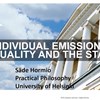carson
Study Shows Why People Dislike Carbon Taxes
A carbon tax would be effective and inexpensive – so why do people dislike the idea? A new study provides answers. Economists agree that a carbon tax is one of the most cost-effective ways to reduce gr No, not at all, according to a new study.
Pitcovski’s explanation-based account of harm
Philosophical Studies Abstract In a recent article in this journal, Eli Pitcovski puts forward a novel, explanation-based account of harm. We seek to show that Pitcovski’s account, and his arguments in
Lukas H. Meyer: Fairness is most relevant for country shares of the remaining carbon budget
Lukas H. Meyer, Professor of Philosophy at the University of Graz, Austria, and Speaker of the Field of Excellence Climate Change Graz, the Doctoral Programme Climate Change, and the Working Unit MoraIn my talk I argue that fairness concerns are decisive for eventual cumulative emission allocations shown in terms of quantified national shares.I will show that major fairness concerns are quantitatively critical for the allocation of the global carbon budget across countries. The budget is limited by the aim of staying well below 2°C. Minimal fairness requirements include securing basic needs, attributing historical responsibility for past emissions, accounting for benefits from past emissions, and not exceeding countries’ societally feasible emission reduction rate. The argument in favor of taking into account these fairness concerns reflects a critique of both simple equality and staged approaches, the former demanding the equal-per-capita distribution from now on, the latter preserving the inequality of the status-quo levels of emissions for the transformation period. I argue that the overall most plausible approach is a four-fold qualified version of the equal-per-capita view that incorporates the legitimate reasons for grandfathering.
Climate ethics and future generations
Workshop within the research project "Climate ethics and future generations", 27–29 September. Audience members admitted by invitation only. 1st Day – 27th September 8:45 – 9:15 Coffee/Breakfast 9.1
Climate policy in British Columbia: An unexpected journey
Frontiers in Climate 4 Abstract Since introducing a path-breaking carbon tax in 2008, the western Canadian province of British Columbia (BC) has attracted significant attention from climate policy schola

Conservative climate justice for a sustainable transformation
The purpose of this project is to determine whether, and how, conservative principles can support an effective and just low-carbon transition.
Well-being and population ethics
Workshop on well-being and population ethics. Part of the project ‘Valuing future lives’ (‘Att värdera framtida liv’), funded by the Swedish Research Council (‘Vetenskapsrådet’). Venue: The Institute f
Mark Jaccard: Economic Efficiency vs Political Acceptability Trade-offs in GHG-reduction Policies
Mark Jaccard, Professor in the School of Resource and Environmental Management at Simon Fraser University, VancouverAbstractThere are obvious reasons why for three decades most jurisdictions have failPublic surveys and observation of real-world GHG reduction successes suggest that explicit carbon pricing (carbon tax and perhaps cap-and-trade) can be substantially more politically difficult than certain regulatory policies for shifting the energy system on to a deep decarbonization trajectory. Nonetheless, some people have argued that carbon pricing is an essential GHG reduction policy, suggesting that sincere politicians must do carbon pricing no matter how politically difficult. But the claim that carbon pricing is essential is factually incorrect. Deep decarbonization can be achieved entirely with regulations. Regulatory policies are unlikely to be as economically efficient as carbon pricing. But not all regulations perform identically when it comes to the economic-efficiency criterion. Flexible regulations have some attributes that make them low cost relative to regulations that require adoption of specific technologies.This talk provides evidence that assesses both the relative economic efficiency of policies and their relative political acceptability. The findings reported here suggest that some kinds of flexible regulations can perform significantly better than explicit carbon pricing in terms of relative political cost per tonne reduced while performing only marginally worse in terms of economic cost per tonne reduced. Presumably, this type of trade-off information could be of value to politicians who sincerely want deep decarbonization but would also like to be rewarded with re-election so that they and competing politicians see the value in ambitious and sustained GHG reduction efforts.
Garrett Cullity: Offsetting and Risk-Aggregation
Garrett Cullity, Hughes Professor of Philosophy, School of Humanities, Faculty of Arts, The University of Adelaide, South Australia.Abstract When well-off individuals do not offset their own personal g

Säde Hormio: Individual emissions, equality and the state
Seminar with Säde Hormio, researcher in Practical Philosophy at the University of Helsinki. ABSTRACT The amount of greenhouse gases that can still be emitted to the atmosphere is very limited if global








